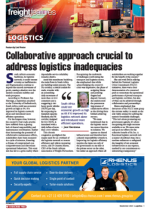Globa lly, f reight forwarders, transporters, 3PLs and supply chain professionals are experiencing mounting pressure on margins.According to recent research released by Transport Intelligence (Ti), the main factor driving this pressure is increased costs. Increased competition and stabilising consumer demand also play a role.“Given the current economic climate, the study results are unsurprising,” Ti researcher Nia Hudson said. “Costs for 3PLs have been increasing across the board as record-high inf lation persists. 3PLs also have to contend with a new wave of fulfilment competitors chasing e-commerce market share – from single-location warehousing companies catering to fulfilling orders for online retailers and Amazon preparation and fulfilment services to multi-location providers offering on-demand warehouse solutions. Furthermore, consumer demand is f lattening, particularly following the post-Covid normalisation of e-commerce and persistent macroeconomic challenges.”With global growth projected to fall from an estimated 3.4% in 2022 to 2.9% in 2023 as the war in Ukraine continues and inf lation remains high, the outlook for margins remains depressed. Few industry experts expect an easing in margins.Hudson said a study by Ti showed that a more substantial boost from pent-up demand or faster-falling inf lation remained entirely plausible. Economic activity, she said, could also be boosted by the ongoing economic recovery in China.“The majority of respondents interviewed, however, believe pressures will intensify over the next 12 months, negatively impacting margins.”Asked about what efforts were being made to address the ongoing concerns, Ti found that the key investment focus for most forwarders and 3PLs was technolog y, automation and digitalisation. This is a critical development for the logistics sector, which is dealing with increasing competition and shifting consumer demands.The study also found that most of the world’s warehouses were still not wholly automated, creating massive opportunities for technology adoption and improved efficiency in the supply chain.During a recent Transport Forum, Jacob van Rensburg, head of research and development for the South African Association of Freight Forwarders, said visibility was vital across the supply chain.“Efficient logistics is a critical factor in socio-economic growth and development. For trade to f low smoothly, it requires the effective functioning of global value chains and participation in them. Improved logistics performance – the vehicle of trade, so to speak – increases the efficiency in trading by reducing the time and cost to trade that can then result in increased volumes.”He said logistics performance continued to be measured in time, cost, service reliability and the risks associated with moving goods. While there were many data generators in the logistics environment, technological uptake remained low, he said.

